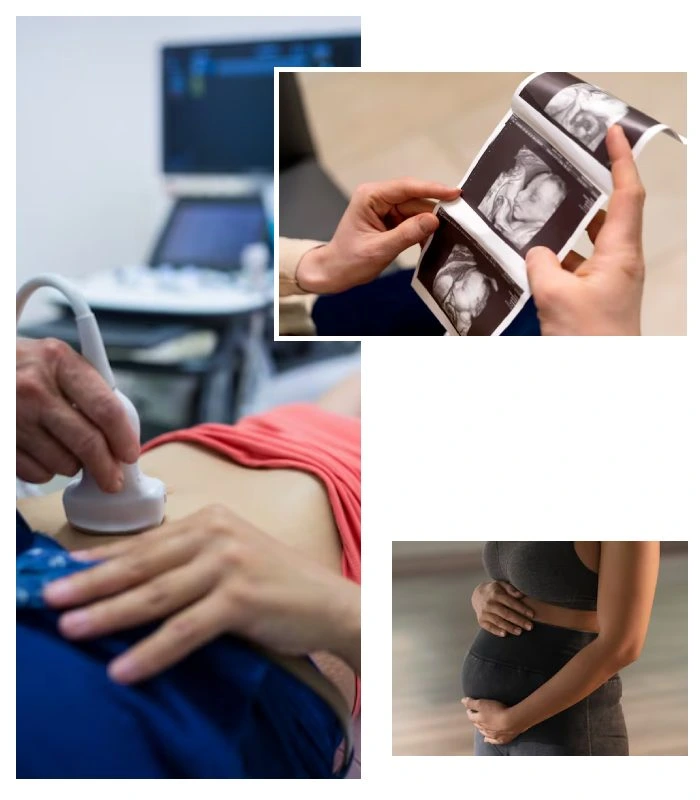Home > High-Risk Pregnancy
Best High-Risk Pregnancy Treatment in Kolkata
What is a High-Risk Pregnancy?
A high-risk pregnancy is one where there are increased health risks for the pregnant woman, the fetus, or both. Factors such as existing health conditions and age (being over 35 or under 17) can contribute to a pregnancy being classified as high-risk. Such pregnancies necessitate careful monitoring to minimize the likelihood of complications.
Signs of a High-Risk Pregnancy
Signs of high-risk pregnancy include the following.
- Persistent abdominal pain
- Chest pain
- Dizziness or fainting
- Severe fatigue
- A noticeable decrease or cessation in fetal movement
- Heart palpitations
- Nausea and vomiting that exceeds typical morning sickness
- A severe headache that won’t subside or worsens
- Swelling, redness, or pain in your face or limbs
- Difficulty breathing
- Vaginal bleeding or a significant increase in discharge
Contact Dr. Pallab Roy, a renowned high-risk pregnancy gynecologist in Kolkata, if you notice any of these signs.
Book Appointment
High-Risk Pregnancy vs Normal Pregnancy
| Factors | High-risk Pregnancy | Normal Pregnancy |
|---|---|---|
| Monitoring Frequency | Requires more frequent monitoring, including additional tests and visits. | Routine monitoring with standard prenatal visits. |
| Monitoring Frequency | May involve additional medical interventions, such as medications or specialized treatments. | Generally, it involves standard prenatal care without extra interventions. |
| Complications | Higher risk of complications such as gestational diabetes, preeclampsia, premature birth, etc | Lower risk of complications, with fewer occurrences of pregnancy-related issues. |
| Specialist Care | Often requires consultation with specialists (e.g., maternal-fetal medicine specialists). | Generally managed by the primary obstetrician. |

High-Risk Pregnancy Causes
A high-risk pregnancy can arise from pre-existing medical conditions or develop due to complications during pregnancy. It is important to inform the gynecologist about any medical issues or complications from previous pregnancies to ensure appropriate high-risk pregnancy management and care. The most common high-risk pregnancy factors have been stated below.
Pregnancy risks are generally higher for individuals under 17 or over 35.
Certain lifestyle choices can increase pregnancy risks, such as:
- Drinking alcohol
- Smoking cigarettes, vaping, or using other tobacco products
- Using illegal drugs
Pre-existing medical conditions that can elevate pregnancy risks include:
- High blood pressure
- Obesity
- Diabetes
- Epilepsy
- Thyroid disease
- Heart or blood disorders
- Poorly controlled asthma
- Infections
Issues that develop during pregnancy that can raise risks include:
- Abnormal placement of the placenta.
- Very low fetal growth, also known as fetal growth restriction, where the fetus's size is less than the 10th percentile for its gestational age.
- Rh sensitization, where the pregnant person's blood is Rh-negative and the fetus's blood is Rh-positive.
- Pregnancies involving more than one fetus have higher risks for both the mother and the fetus.
- Previous pregnancy complications can raise the risk of recurring issues, including: High blood pressure-related conditions such as preeclampsia , Preterm delivery, Genetic conditions in the baby, Miscarriage or stillbirth
High-Risk Pregnancy Tests
Based on your specific circumstances, the gynecologist may recommend certain tests to manage a high-risk pregnancy. High-risk pregnancy treatment is determined based on the results of the following tests:
Ultrasounds: This imaging test uses high-frequency sound waves to create images of the fetus on a screen and is safe for both the pregnant person and the fetus.
- 3D or 4D Ultrasounds: These high-risk pregnancy screenings are useful for identifying potential issues, such as abnormal fetal development.
- Cervical Length Ultrasound: Measures the length of the cervix to assess the risk of premature labor.
Also known as cfDNA screening, this test uses a blood sample from you to analyze both your DNA and the fetus's DNA. It can detect potential chromosome problems that might indicate genetic conditions.
- Amniocentesis: Performed usually after the 15th week of pregnancy, this test involves sampling the amniotic fluid surrounding the fetus to check for genetic conditions and neural tube defects.
- Chorionic Villus Sampling (CVS): Usually done between weeks 10 and 13 of pregnancy, this test involves taking a sample of cells from the placenta to detect genetic conditions and confirm results from cell-free DNA screening.
Blood and urine samples can be analyzed to check for infections, anemia, diabetes, and potential genetic conditions, helping to monitor overall health and identify any increased risks.

What are some ways to prevent a High-Risk Pregnancy?
To prevent a high-risk pregnancy, the gynecologist recommends the following instructions.

Getting Immunizations
Ensure you are up-to-date on recommended vaccines.

Maintaining a Healthy Diet and Weight
Follow a balanced diet and keep your weight within a healthy range.

Engaging in Regular Physical Activity
Stay active, unless your doctor advises otherwise.

Avoiding Harmful Substances
Refrain from smoking, drinking alcohol, or using illegal drugs, and only use medications approved by your doctor.

Using Approved Medications
Take only those over-the-counter and prescription medications that have been approved by the gynecologist.

Managing Health Conditions
Work with the doctor to control any existing conditions such as diabetes, high blood pressure, or infections.
Frequently Asked Questions
In a High-Risk Pregnancy, it's important to have a plan in place for emergency care. Ensure you know the signs of potential complications, such as severe abdominal pain, heavy bleeding, or difficulty breathing.
Common complications in High-Risk Pregnancy include preeclampsia (high blood pressure and organ damage), gestational diabetes, preterm labor, fetal growth restriction, placental abruption (the placenta separating from the uterine wall), and Rh incompatibility (when the mother's blood type is incompatible with the baby's). Other issues can include multiple pregnancies (twins or more), uterine abnormalities, and chronic health conditions such as heart disease or kidney problems.
Yes, it is often possible to continue working during a High-Risk Pregnancy, but it depends on your specific condition and the nature of your job.
Avoid activities that could strain your health, such as heavy lifting or high-impact exercise, and practice good self-care, including getting enough rest and managing stress.
Management of a High-Risk Pregnancy often involves more frequent prenatal visits, specialized tests, and additional monitoring. This may include ultrasounds, non-stress tests, blood tests, and other diagnostic procedures. Depending on the risks, the gynecologist might also suggest changes to the mother’s lifestyle or medications to manage health conditions.
To improve outcomes, it's essential to follow the gynecologist’s recommendations closely. This includes attending all scheduled prenatal appointments, adhering to any prescribed medications or treatments, making lifestyle changes as needed (such as dietary adjustments or quitting smoking) and managing any underlying health conditions. Regular communication with the doctor and prompt reporting of any unusual symptoms can also help manage risks effectively.
